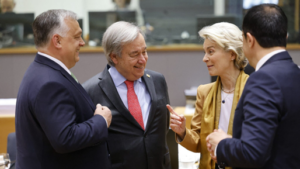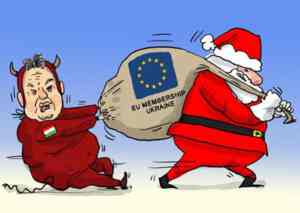By Brenda, Giulia and Ot
Since unfreezing 10,2 Billion on EU funds for Hungary, the Commission has been the center of attention. Initially frozen because of rule of law concerns, the funds were unblocked just before the commencement of an EU summit about the possible accession of Kyiv and new aid for Ukraine. The Hungarian leader, Prime Minister Orbán, openly stated his eagerness to block these moves. The European Parliament, unhappy with the Commission’s actions, is preparing to start proceedings against the Commission stating: “the rule of law can not be traded for deals with Orbán”. The sudden withdrawal from the Commission raises questions whether the Commission is the institution fit to guard the rule of law. Former CJEU AG Miguel Maduro puts forward the Fundamental Rights Agency (FRA) to take over the enforcement and monitoring functions.
This blogpost looks into the possibility of FRA getting more responsibility in enforcing the rule of law. Besides showing the Commission’s enforcement gap in EU law, FRA’s fitness, bolstered by its independence and expertise, to partially take over the job is also argued. Finally, we argue that FRA could fill the enforcement gap if given an alarming and more extensive advisory role and maybe even, in an ideal world, the power to request the Commission to initiate an infringement procedure.
Orbán threatening to blow up EU’s Ukraine policy
The Enforcement Gap
Since the Commission has two major roles, one as a political actor and one as Guardian of the Treaties (Article 17 TEU), problems arise with performing both roles equally and effectively, i.e., there is an ‘enforcement gap’. Let us take the backsliding of democracy in Poland as an example to illustrate this.
Since the end of 2015, soon after their parliamentary elections, Poland started to repeatedly infringe upon EU law. It went from bad to worse, and the Polish government systemically failed to comply with the rule of law, as laid down in Article 2 TEU. The major criticism of the Commission’s actions is its failure to initiate infringement procedures, as the first procedure was only initiated in 2018. It took the Commission until that time to acknowledge the ineffectiveness of its ongoing dialogue procedures. Even after this acknowledgement, the Commission still only started less than one infringement procedure each year. Finally, after a clear ruling of the CJEU on the rule of law breaches of the Polish government, the Commission did not ask the CJEU for a daily penalty payment, but adopted an ineffective additional letter of formal notice. Therefore, in addressing the rule of law concerns in Poland, the Commission has done too little, too late.
This hesitancy in enforcing EU law, can be explained by the need of the Commission from the early 2000s onwards to gain more support from Member States’ governments for policy-making in the EU. Tension arose between the Commission’s dual roles, partially giving up its duty as Guardian of the Treaties.
European Parliament brings Commission before CJEU

FRA to the rescue
Empowering FRA with enforcement powers could significantly enhance its powers in the fight for justice and democracy within the EU. Picture this: a fundamental rights protector, free from political strings, that swoops in to ensure that Charter rights are upheld in practice.
Article 16 of Regulation 168/2007 sets the stage: FRA shall operate free from any political influence and act in pursuit of the public interest. In essence, the agency can provide impartial assessments of rule of law situations across the EU and is able to check that the spending of EU funds is Charter-compliant. In other words, its independence brings an added value to safeguarding Community fundamental rights policies when compared to “in-house” implementations by Commission departments.
But FRA’s capability does not stop here. Indeed, the agency’s mandate is intertwined with Charter rights. This gives FRA expertise in positive obligations under international and EU human rights law, legitimizing it to effectively investigate and act upon violations of the rule of law to ensure that the integrity of the spending of EU funds is respected. FRA is thus suited to provide tailored support during the programming period – a timeframe during which the Union allocates funding for various programs and initiatives, followed by the Member States developing operational programs outlining how they intend to use such funds – to identify and address potential violations of fundamental rights before funds are allocated and projects are implemented.
FRA bridging the enforcement gap
FRA could contribute to bridging the enforcement gap by taking on an alarming and advising role. Within its current role of providing expertise, data and analysis on fundamental rights issues, a system can be set up in which FRA could use its knowledge to spot possible infringements and then actively alarm and move the Commission to address these infringements. Where there’s smoke, there’s fire.
Extending FRA’s advising role to the infringement procedure of Art. 258 TFEU could make it an independent mediator in the administrative phase of the procedure, mitigating the political influence. As an expert of fundamental rights, FRA could take over the dialogue with the Member States, report on the circumstances and advise the Commission on reasoned opinions to send to the Member States with an ultimatum to fix the situation. Member States would find it imperative to heed FRA’s reports, since they will directly influence the Commission’s decision to initiate proceedings. Also, the Commission can refer to independent reports of FRA when confronted with an angry Member State. Since the Commission is the one to engage in dialogue, the chance of being politically influenced is nullified: a win-win.
Lastly, in an ideal world, FRA would have the power to initiate infringement procedures before the Commission. As is shown, the Commission has initiated infringement procedures way too late when confronted with the rule of law concerns in Poland and Hungary. An independent agency like FRA could nudge the Commission with its voice of reason, to prioritize upholding democratic values across the Member States without delay.
- [DRAFT] Frontex’s duties and refugees’ rights: an effectiveness vs. legality example at the EU borders. - April 11, 2024
- [DRAFT]EPPO in its first test before the CJEU: Case C-281/22 G.K. and Others (Parquet Européen) - April 11, 2024
- The Fundamental Rights Officer: Just what the EUAA needed - April 11, 2024

